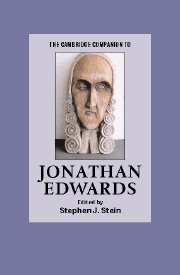Book contents
- Frontmatter
- Introduction
- Part I Edwards’s life and context
- Part II Edwards’s roles and achievements
- 5 Edwards as preacher
- 6 Edwards as revivalist
- 7 Edwards as theologian
- 8 Edwards as philosopher
- 9 Edwards as biblical exegete
- 10 Edwards as missionary
- Part III Edwards’s legacy and reputation
- The Works of Jonathan Edwards
- Further Readings
- Index
- Series List
10 - Edwards as missionary
from Part II - Edwards’s roles and achievements
Published online by Cambridge University Press: 28 November 2007
- Frontmatter
- Introduction
- Part I Edwards’s life and context
- Part II Edwards’s roles and achievements
- 5 Edwards as preacher
- 6 Edwards as revivalist
- 7 Edwards as theologian
- 8 Edwards as philosopher
- 9 Edwards as biblical exegete
- 10 Edwards as missionary
- Part III Edwards’s legacy and reputation
- The Works of Jonathan Edwards
- Further Readings
- Index
- Series List
Summary
Jonathan Edwards is rarely remembered for his work as missionary to the Indians. Until recent decades, scholars were interested in Edwards first and foremost as a towering figure in America's intellectual history, while evangelicals have long nurtured an interest in Edwards the revivalist and critic of modern rationalism. The seven years he spent at the mission outpost in Stockbridge at the end of his life are ambivalently remembered at best as a period of productive exile following his dismissal from his Northampton pulpit in 1750. The turn toward the “new social history ” in the early 1970s, however, opened new avenues of inquiry into Edwards's life, including his family life, his role as pastor, and, more recently, his years as a missionary.
This chapter begins with a brief overview of Edwards's involvement in Indian mission work prior to his removal from Northampton and his acceptance of the Stockbridge post. In addition, a brief review of the history of the Stockbridge mission before Edwards's arrival sets the stage for a consideration of his years as missionary, during which time he served as defender, pastor, and preacher to the Stockbridge Indians. This chapter also considers what traces Edwards's experiences as a missionary may have left on the philosophical and theological treatises written during his Stockbridge tenure. A final section evaluates the legacy of Edwards's missionary work in relation to the impact of colonial missionary work in general as well as his particular legacy among the Stockbridge Indians.
- Type
- Chapter
- Information
- The Cambridge Companion to Jonathan Edwards , pp. 196 - 214Publisher: Cambridge University PressPrint publication year: 2006
- 2
- Cited by



